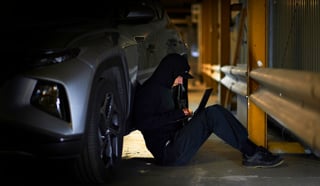The Metropolitan Police led the way with the introduction of ‘black box’ technology, installing 2,000 units across its fleet of vehicles.
But, more than a decade later, a recent court case should act as a reminder to fleets of the wider benefits.
Tony Read was with the Metropolitan Police for 30 years, spending 28 as a traffic cop and 22 in crash investigation, before joining TRL three years ago.
His police career saw him investigate hundreds of road crashes, including the one in Paris in which Princess Diana died.
But in recent weeks Read has been gathering evidence from an airbag.
A 55-year-old man was prosecuted at Oxford Crown Court for causing death by dangerous driving when his Chrysler 300 ploughed into the back of a queue of traffic on the M40.
The 70mph impact killed a passenger in the vehicle in front of him.
American car manufacturers must make airbag systems that can be investigated to assess speed, deceleration and braking in the event of a crash.
Read was asked by Thames Valley Police to assess the data, which revealed the driver had only started to brake 0.5 seconds before impact.
“The data was crucial in successfully prosecuting the driver, but it could equally be used in a driver’s defence,” he says.
“It could prove vital in defending a charge of corporate manslaughter, while the day-to-day benefits of this type of technology have been proven over a number of years.”
Data provides much more accurate evidence on the standard of driving resulting in a crash. Driver alertness or vehicle speed can be difficult or impossible to assess accurately afterwards.
Read was a member of the Met’s implementation team when it started fitting vehicles with a black box in 1999.
He says: “A number of vehicles had been involved in accidents and studies showed a considerable cost saving by fitting accident data recorders to the Berlin Police fleet. It was able to moderate driver behaviour and enabled them to employ a more robust defence when claims were made against them.”
Within three years of fitting its black boxes, the Met saved £2 million in accident-related costs – repair bills and vehicle downtime – following a 25% drop in accident rates.
A Dutch study, examining several fleets, estimated a crash reduction rate of 20% after fitting black boxes.
Both results are largely down to the pyschological impact on the driver of having the boxes fitted to their vehicle.
Most modern cars monitor a number of electronic data inputs but typically do not retain this data after a crash.
Vehicles in the USA have that ability, often referred to as an event data recorder (EDR).
Some EDRs continuously record data, overwriting the previous few minutes until a crash stops them. Others are activated by crash-like events, continuing to record after the accident.
However, manufacturers are not required to allow access to this data – and most are reluctant to do so. This stems from the fact that the data was never intended to be used in accident investgations.
Read believes better data would help to distinguish between careless and dangerous driving.
Telematics suppliers might move into this area. Current systems are limited because they are mostly GPS-driven and Read says their usefulness depends on the type of incident.
“They weren’t envisaged for accident investigation work,” he adds. “They have big limitations.”
ADRs made compulsory in US
The National Highway Traffic Safety Administration (NHTSA) in America has made the fitting of ADRs in cars mandatory from September 1, 2012.
It stipulates a minimum standard for the types of data that ADRs are required to record – at least 15 – including pre-crash speed, engine throttle, brake use and measured change in forward velocity.
It also insists that the resulting data is accessible. In the case of the M40 crash, Tony Read was able to use the Bosch crash data retrieval (CDR) tool, which costs £2,000-3,000 per unit, to download a range of statistics, because Chrysler is one of a number of US-built cars, including Ford and GM, which has already complied with the ruling.
The EC has been looking into ADRs for the past five years. It recommends making it compulsory for all European vehicles – and for manufacturers to allow access to the data – although its report is currently gathering dust.
























Login to comment
Comments
No comments have been made yet.